#Speech or Debate Clause
Text
Former Vice President Mike Pence will not appeal a federal judge’s order that he testify in the special counsel’s probe of former President Donald Trump’s attempt to overturn the 2020 election, his adviser announced Wednesday.
The decision not to fight the order could provide special counsel Jack Smith with remarkable access to one of the key people with critical insight into Trump’s thinking and efforts to cling to power.
Last week, Judge James Boasberg, the chief judge of U.S. District Court for the District of Columbia, largely dismissed efforts mounted by Pence and Trump to limit his testimony and avoid handing over documents.
Boasberg acknowledged a constitutional argument against forcing Pence to testify in front of a grand jury about matters related to his role as Senate president during the certification of the election on Jan. 6, but nevertheless concluded that immunity should not prevent Pence from testifying about conversations related to alleged “illegality” on Trump’s part.
“Vice President Mike Pence swore an oath to support and defend the Constitution, and his claim that the Biden Special Counsel’s unprecedented subpoena was unconstitutional under the Speech or Debate Clause was an important one made to preserve the Separation of Powers outlined by our Founders,” Pence adviser Devin O’Malley said in a statement Wednesday. “In the Court’s decision, that principle prevailed. The Court’s landmark and historic ruling affirmed for the first time in history that the Speech or Debate Clause extends to the Vice President of the United States. Having vindicated that principle of the Constitution, Vice President Pence will not appeal the Judge’s ruling and will comply with the subpoena as required by law.”
It’s unclear exactly when Pence will appear before the grand jury in Washington, according to a source familiar with the matter, and the case remains under seal. Trump’s attorneys could still appeal Boasberg’s ruling. Last week, his legal team filed an appeal to block the testimony of several of his senior aides.
Pence has already published a memoir and Wall Street Journal op-ed detailing several significant interactions with Trump in the days leading up to Jan. 6. NBC is told prosecutors are focused on specific efforts Trump took to try to block the certification of the election.
#us politics#news#nbc news#2023#donald trump#republicans#conservatives#trump administration#gop#mike pence#special counsel#Jack Smith#subpoena#Judge James Boasberg#U.S. District Court for the District of Columbia#Speech or Debate Clause#us constitution#Separation of Powers
13 notes
·
View notes
Text
Prosecutors have the gold bars Menendez supposedly received as a corrupt payment, a cooperating witness, and text messages that, they say, showed the senator promising to take votes and other official actions in exchange for bribes.
But the prosecution is being complicated by the Constitution’s Speech or Debate Clause—or at least by the trial judge’s expansive reading of it. This provision aims to allow lawmakers to avoid legal liability for things they say or do in Congress. The idea is to protect elected representatives from being sued or prosecuted for performing their constitutional duties.
You might assume that this clause—while sensibly protecting lawmakers from things like libel suits or criminal charges over controversial floor speeches—would have a carveout for public corruption cases. It, in fact, does not. Read literally, it appears quite broad. “For any speech or debate in either House, [members of Congress] shall not be questioned in any other place,” it says.
The feds had argued they could sidestep this provision by avoiding evidence concerning officials acts Menendez took. Instead, they planned to focus on text messages related to his alleged promises to take corrupt actions.
But last week, after the trial was well underway, US District Judge Sidney Stein said he would bar prosecutors from introducing text messages that, they allege, showed the people who bribed Menendez discussing “getting their money’s worth” from the senator.
You see you can argue Trump isn't being politically prosecuted but it's hard when it's impossible to prosecute congressmen even for the most flagrant corruption possible.
27 notes
·
View notes
Photo

(via AZ panel votes to ban Satan displays from public property)
Arizona’s legislature is STILL a bunch of anti-constitution religious nuts:
PHOENIX — Calling Satan “an explicit enemy of God,’’ a state senator is pushing to keep displays of him, by any name, off of public property.
Just Satan. Christmas trees and menorahs would still be allowed.
”It is a desecration of our public property in the United States of America and in the state of Arizona for a satanic display, memorial, altar, etc., to be on public property,’’ said Sen. Jake Hoffman, a Queen Creek Republican.
He pushed the measure through the Senate Government Committee Wednesday on a 5-1 party-line vote.
All that drew questions.
”It is because it’s insulting to your religion?’’ asked Sen. Juan Mendez, D-Tempe.
Hoffman said that’s not his motive.
The legal issue goes beyond that.
The Satanic Temple has been recognized by the Internal Revenue Service as a religion and entitled to the same charitable status as any other.
“I am genuinely impressed that in only 25 words this bill seems to violate three separate clauses of the First Amendment to the U.S. Constitution,’’ testified Micah Mangione, an individual who showed up to testify against the bill.
These, he said, are prohibiting the government from establishing a religion, barring government interference with the free exercise of religion, and guaranteeing the right to free speech. He warned the Republicans there are implications for their support of SB 1279.
”If you can go after the Satanic Temple, which is a religion, what about paganism next?’’ Mangione asked. “What about Judaism next? How about Islam? How about LDS?’’
What the legislation does is declare that only Christian values matter, he said.
Hoffman said he doesn’t see it that way.
”It is legally and constitutionally suspect to argue that Satan, someone who is universally known to be an explicit enemy of God, is somehow a religion,’’ he said. “That is an absolutely ludicrous statement to make.’’
Another individual testifying against the bill, Tonia Francis, told Hoffman what he is proposing interferes with her First Amendment rights.
Hoffman disagreed, saying she remains free to practice whatever she wants — just as long as nothing is erected on public property. Any arguments beyond that are off base, he said.
”So you think that it’s both legally and constitutionally OK to argue that Satan … who is universally known to be explicitly the enemy of God, antithetical to God, you think that’s targeting your religion?’’ Hoffman asked.
”Universally known to you?’’ Francis asked.
”To, literally, everyone,’’ Hoffman responded. “That’s not a point that’s debatable. Would you not say that Satan is the enemy of God?
”No,’’ Francis said.
Hoffman called her testimony “disingenuous.’’
Mendez called the legislation “a straight-up attack on the rights of people and religion.’’
Hoffman can’t even imagine that other people don’t believe in his chosen religion’s world view.
And he’s an elected legislator?!?!
31 notes
·
View notes
Note
Hello:
This is a nuance question. What are the minor differences between tan, tanto, cuán, and lo (adjetivo)poder ser a (sustantivo) when modifying "to an extent" something is?
There's a pattern to these words that can help
Typically the question words have a QU or C sound; and the descriptors here have the T
The question words can sometimes be used as other parts of speech, but the questions or implied unknowns will have accent marks
This will make more sense below
-
First, tal and cual - used to describe nouns, or sometimes become nouns themselves:
tal = such, such as / "one such" [noun]
tales = such, such as / "some such" [plural noun]
cuál = which? / which one
cuáles = which (ones)? / which ones? [plural]
(el/la) cual = the one (in particular), the one that/which, one such
cual = as [in poetry; synonymous with como, very unusual]
If you're seeing tal and cual you're seeing nouns for the most part; tal is "such" or "like that" and cuál is more common with the accent mark or in a relative clause
De tal manera... = In that way... / In such a way...
De tal palo, tal astilla. = "Chip off the old block" / "The apple doesn't fall far from the tree"
[lit. "from such a (wooden) stick, such a splinter"]
Escribe sobre la vida tal y cómo es. = "He/She writes about life exactly how it is."
[tal y cómo is literally "such and how" but often means "exactly so/as"]
Tal leyenda no me interesa. = A legend like that doesn't interest me. / Such a legend doesn't interest me.
There's also an expression Fulanito/a de Tal which is very idiomatic but it's a made up placeholder name like "Mr/Mrs Whoever from Wherever"... fulano/a is basically "someone you don't know their actual name", and de Tal is "from Such" so it comes out as "What's-their-name from Wherever"
...You see this in contexts where someone knows nothing about the person, or they mean so little to them that they can't be bothered to learn their name
You will also see this expression:
(son) tal para cual = "they were made for each other" / "a match made in heaven"
You say this about people who are very much alike
...
Now as for cual you get into questioning words; an unknown noun but specific
If tal is "such", cuál with the accent mark is qué + tal meaning "what such"... aka "which one"
¿Cuál es? = Which one is it?
¿Cuáles son? = Which one are they?
Seeing cual without the accent mark is most commonly used in what they call relative clauses - it's a clause within a sentence that gives more specific information "related" to what noun you just brought up:
Esa torre es la Torre Eiffel, la cual es el edificio más conocido de Francia. = That tower is the Eiffel Tower, which is the most well-known building in France.
El amor, el cual es un tema muy importante para muchísimos autores y poetas, sigue siendo expresado y discutido en el arte de todas formas. = Love, which is a very important theme for MANY authors and poets, continues to be expressed and discussed/debated in art of all kinds.
Relative clause just means you decide to add a comma and talk about a specific noun (which could be a person, place, or thing) almost in an aside
You can also do relative clauses with el que and la que they're just more informal than el/la cual ...it's like saying "the one that" vs "the one which"
....
Also I should say cual can also be used as como in some poetry. It's really uncommon today but every so often in poetry you'll see it.
Like rojos labios cual carmín is the way they translated "lips that shame the red red rose" but it literally means "(VERY) red lips like carmine/vermillion" - it reads like very flowery writing, usually reserved for older things or fairy tales or something that feels antiquated
-
Next we move on to tan/cuán and tanto and cuánto/a and again there's a pattern
tan/cuán work with adjectives and adverbs as "so much" and "how much"
And tanto/a and cuánto/a work with nouns as "so many" and "how much/many?"
...
But actually first let me say you will NEVER have to use cuán for "how much + adjective/adverb"; it is considered very archaic and only appears in lyrics and poetry. The only time I've ever seen it was in the translation for Pocahontas in Colors of the Wind:
¿Cuán alto el árbol crecerá? = "How high does the sycamore grow?"
[lit. "how high will the tree grow?"]
But from that you can say it's "how much" in terms of "to what extent" - if you're using adjectives you use them agreeing with the gender/plurality
More to the point though, what you actually use depends on region and thankfully it's pretty evenly between Spain and Latin America, and reasonably understandable what you're saying/hearing regardless so no one's really confused it's just a difference in region:
Latin America will use qué tan (which is a deconstructed cuán), and Spain prefers cómo de which is more like "to what extent"
¿Qué tan alto es el árbol? = How tall is the tree?
¿Qué tan alta es la montaña? = How high is the mountain?
¿Cómo de alto es el árbol? = How tall is the tree?
¿Cómo de alta es la montaña? = How high is the mountain?
¿Qué tan lejos? = How far (away)? [adv]
¿Cómo de lejos? = How far (away)? [adv]
And again adverbs won't need to agree; ¿qué tan rápido/a? is "how fast" for example as an adjective, but ¿qué tan rápido? by itself could be "how quickly?"; same with cómo de - only difference is that's for Spain
And cuánto is used for amounts, "how much/many?"
¿Cuánto cuesta? = How much does it cost?
¿Cuánta comida hay? = How much food is there?
¿Cuántos hombres? = How many men?
¿Cuántas mujeres? = How many women?
No sabes cuánto te quiero. = You don't know how much I love you.
[cuánto here as a noun is like "the (unknown) amount"]
PS en cuanto + subjunctive is "as soon as + subjunctive"; don't worry about it for right now, but every so often you see a cuanto with no accent mark
...
So on to tan and tanto/a, same general distinction
tan is "so/quite/very" used with adjectives and adverbs, and tanto/a is often done with nouns and countable things
Eres tan listo. = You're so smart.
Eres tan lista. = You're so smart.
Son tan listos. = They're so smart.
Son tan listas. = They're so smart.
Hay tanta ropa. = There's so much clothing. / There's so many clothes.
Hay tanto peligro. = There's so much danger.
Tenemos tantos problemas. = We have so many problems.
Tenemos tantas personas. = We have so many people.
It's really the same difference between mucho/a and muy
With comparisons, you use tan or tanto with como. The important thing here is that these are expressions of equality or equivalence, rather than "more/better" or "less/worse" that you'd see with más/mejor and menos/peor.
Es tan listo como ella. = He's as smart as she is.
Es tan lista como él. = She's as smart as he is.
Son tan listos como ellas. = They're as smart as they [f+f] are.
Son tan listas como ellos. = They're as smart as they are.
Sus libros no son tan famosos como sus poemas. = Their books aren't as famous as their poems.
Sus películas no son tan famosas como sus obras de teatro. = Their movies aren't as famous as their theatrical works.
tanto como is more used as "(someone) as well as (someone else)" or "(something) as much as (something else)"... usually in the context of something pertaining to or affecting something/someone, or just overall "involvement"
Tanto yo como mis colegas... = Myself as well as my colleagues...
Tanto tú como tus amigos... = (Both) You as well as your friends...
And you use it to compare equal amounts of things with others:
Tienen tanto dinero como yo. = They have as much money as I do.
Tienen tanta influencia como nosotros. = They have as much influence as we do.
Tengo tantos amigos como amigas. = I have as many (male) friends as (female) friends.
Tengo tantas amigas como amigos. = I have as many (female) friends as (male) friends.
You can also see tanto as an amount like "as much" or "so much" just a plain noun, or an adverb like saying no tanto "not so much" or "not really"
And then there's mientras tanto which is "meanwhile" [lit. "while as/so much"]
-
And I'm not entirely sure what you mean by lo in context with comparisons so I'd probably need more context
I'm used to seeing things like lo más antes posible "as soon as possible" or "the soonest possible", or lo más imporante "the most important thing"
Also lo máximo/mínimo que as like "the most/least that (+ something else)"
#spanish lessons#langblr#learning spanish#spanish grammar#language#languages#asks#la gramatica#long post
48 notes
·
View notes
Text

LETTERS FROM AN AMERICAN
September 29, 2023
HEATHER COX RICHARDSON
“What a day we are having…. As a former director of emergency management, I know a disaster when I see one,” Representative Jared Moskowitz (D-FL) said yesterday in the impeachment inquiry into President Joe Biden, overseen by the Republican-led House Oversight Committee chaired by James Comer (R-KY).
Moskowitz wasn’t wrong. After a hearing that lasted more than six hours, highlights of which Aaron Rupar of Public Notice reposted on social media, Neil Cavuto of the Fox News Channel was unimpressed. He said that although Comer had promised to present “a mountain of evidence” against President Biden, “none of the expert witnesses today presented…any proof for impeachment…. The way this was built up, ‘where there’s smoke there would be fire,’... but where’s there’s smoke today, we just got a lot more smoke.”
The Republicans on the committee repeatedly talked about the volume of evidence they have uncovered, but they were never able to link their piles of evidence to the president. Under questioning, their own witnesses said there was not enough evidence to impeach President Biden.
It seemed as if Republicans have become so accustomed to being able to say anything they want to on right-wing media without being challenged they thought a congressional committee would operate the same way. When the Democrats pushed back, they seemed flummoxed.
Comer lost control of the hearing as Democrats on the committee, thoroughly prepared, came out swinging. Representative Shontel Brown (D-OH) noted that “[t]he DOJ and FBI under former President Trump spent 5 long years looking into these Republican conspiracy theories, and debunked them. Repeatedly.” Representative Jamie Raskin (D-MD) said, “The majority sits completely empty handed with no evidence of any presidential wrongdoing, no smoking gun, no gun, no smoke.”
Representative Summer Lee (D-PA) called out the Republicans by name for holding a sham impeachment hearing instead of funding the government and working for their constituents. She noted that 217,583 people living in the districts of the Republicans on the committee would lose their paychecks because of the Republican shutdown.
Most notably, the Democrats called out the places where witnesses or committee members had deleted words in quotations that changed their meanings. Representative Alexandria Ocasio-Cortez (D-NY) emphasized that the four Republican witnesses said they had not presented any first-hand witness accounts of crimes committed by President Biden, while the committee was blocking the testimony of witnesses who could testify to actual facts. She also noted that members of Congress could say anything they wanted because they are covered by the Constitution’s Speech and Debate clause protecting them,
Democrats also called out the many ways in which the Republicans were trying to discredit President Biden with speculation during an impeachment hearing to distract from the very real legal troubles of former president Trump. Representatives Mike Garcia (D-CA) and Gerry Connolly (D-VA) called out the Republicans for focusing on allegations about Hunter Biden and ignoring the very real issues involving Trump’s son-in-law Jared Kushner, who could not get a security clearance until Trump demanded he be given one, worked on Middle East issues in the White House, and then received a $2 billion investment from the Saudis shortly after Trump left office.
Most dramatically, Representative Greg Cesar (D-TX) asked the members of the Oversight Committee to raise their hands if they believe that both Hunter and Trump should be held accountable if they are found guilty on any of their indictments. The Democrats all raised their hands. The Republicans did not.
One senior republican aide told CNN’s Melanie Zanona: “This is an unmitigated disaster.”
It did not get better after the hearing ended. A fact-check by CNN’s Daniel Dale, Marshall Cohen and Annie Grayer tore apart the committee’s “evidence.” Although Comer said in his opening remarks that the committee has uncovered how “the Bidens and their associates…raked in over $20 million between 2014 and 2019,” all but about $7 million went to Hunter Biden’s business associates, who according to the Washington Post had “legitimate business interests,” and there is no evidence that President Biden himself received any of this money.
Comer’s accusation that money was wired to Joe Biden’s Delaware address did not note that the money was a loan, and it went to Hunter Biden’s bank account. Hunter Biden’s lawyers say that he used the Bidens’ Delaware home as his address at the time.
Representative Jim Jordan (R-OH) claimed that documents released Wednesday from 2020 showed that the Department of Justice was protecting President Biden. But in 2020 Trump, not Biden, was president, and the official who urged Biden senior’s name be kept off a search warrant did so because there was no legal basis to include him in a search warrant concerning a business involving his adult son.
And on it went.
Charlie Sykes of The Bulwark wrote: “The charitable view is that the first hearing was a dumpster fire inside a clown car wrapped in a fiasco. To put it mildly, the GOP did not bring their best.”
At the end of the day, it seemed as if Democrats had flipped the script that has worked so well for so long on right-wing media. Rather than being on the defensive themselves, they put Republicans on the defensive. And because their hits were based in reality, rather than a false narrative, they left the Republican committee members with few options today other than to take to social media, once again, to boast of all the evidence they have accumulated against President Biden.
The hearing was designed to give the extremists of the Freedom Caucus one of their demands, likely in the hope that they would agree to pass a stopgap funding bill that would at least make it look like the House Republicans were trying to fund the government. But today, when House speaker Kevin McCarthy (R-CA) brought to the floor an extreme bill that would have made 30% cuts to food assistance, housing, education, funding for border agents, and so on, and insisted on closing the border while funding the government for only another 30 days, 21 extremists voted with the Democrats to kill it by a vote of 198 to 232.
This was a harsh blow not only to McCarthy but to all the Republicans in swing districts. House leaders forced them all to vote for a measure chock full of enormously unpopular cuts and then snatched away the prize of funding the government. Such a political disaster speaks very poorly of McCarthy, who should have never put members of his conference in such a position. Losing 21 of his members in this vote is an embarrassment. The loss weakens the party for 2024: the Democratic ads will pretty much write themselves.
And the members refusing to fund the government simply don’t appear to care, either about their colleagues or their constituents.
At any point, McCarthy could bring up before the House the bipartisan measure already passed by the Senate. Democrats would then likely make up the votes he would lose in his own conference. But the extremists would then challenge his speakership, and that is apparently a challenge he is unwilling to brave.
—
LETTERS FROM AN AMERICAN
HEATHER COX RICHARDSON
#Letters From An American#Heather Cox Richardson#clown car#House Republicans#corrupt GOP#GOP lies#government shutdown#cruelty#do your job
23 notes
·
View notes
Text
Dragon Ball Super 061

“Who are you?”
“I’m you, but stronger. Furthermore, I’m substantially more verbose, though you may find this difficult to accept.”
“Indeed, for I have amazed even myself on occasion with my propensity to ramble endlessly on a given topic. Though my diction flows like clear waters across a mountain stream, woe be to any who seek to quench their thirst for meaningful conversation, for I provide only minimal insight in the magnitude of verbiage I employ.”
“Yes, I quite agree! I have often noticed how my own thoughts and feelings seem quite trivial when diluted beneath the deluge of my interminable speech. Though I begin with a point I wish to make, I continue to belabor it, adding word after word, clause after clause, like a builder stacking bricks upon a great tower reaching up into the heavens. And yet, though the great temple is unmatched in splendor, the thought which it houses is so minuscule as to require only a tiny fraction of the space.”
“It is a remarkable similarity we share. Perhaps, it is a good omen. Yes, for if you are another iteration of myself, and we truly are of one mind in fact rather than spirit, then we both share the same dream of perfect justice for the entire universe. A world finally freed from the shackles of evil, released from the fuzzy handcuffs of corruption, and loosed from the kinky chastity belt of mortals, who stain the cosmos with a taint so profound it disgusts me to speak of it. And if our dream is to be fully realized, then what other outcome can there possibly be, save for a universe where only we two remain as its population? In such a divinely pristine creation, a creation restored to its rightful essence, our tendency to prattle endlessly will not be abnormal at all. For such holy voices as ours will be the only speech heard throughout the cosmos.”
“This is nice. I feel like we’re really vibing here. Do you want to go somewhere and get a coffee?”
“Oh, fuck yeah. All Gowasu ever let me drink in this stupid place is tea.”

Okay, so we’re fifteen episodes into this stupid saga, and we’re finally going to get the origin story of Goku Black. I probably need to write a separate thing where I compare the Zamasu Saga to GT, and I think what I need to do is like a side-by-side with the Baby Saga and the Shadow Dragons Saga, because those two arcs are the most similar to Zamasu’s whole storyline. I couldn’t decide which one would be more appropriate, so maybe a three-way thing to decide which is the worst. The point I’m getting at here is that no matter how bad and dumb the Omega Shenron fight got, at least he didn’t have a stupid secret identity on top of the rest of it.
Okay, so let me set the stage here. In Episode 59, Beerus destroyed Zamasu for attempting to assassinate the Supreme Kai of Universe 10. This action would have led to Zamasu securing Gowasu’s Time Ring, the Super Dragon Balls, and Goku Black. So Beerus believed that by destroying Zamasu before he could do all of that, then Trunks’ future world would be at peace.
That hope was shattered in Episode 59, because the next episode preview clearly showed that nothing had changed in Trunks’ world. And yet we still had to wade through Episode 60 to find out the long way. Lots of debate over how time travel works, and now we’re in Episode 61, and we’re still going over this shit. And the good guys will have to go back to tell Beerus he’s wrong, so we’re spending a lot of episodes on this one plot point.
So up until now, the good guys had believed that Zamasu had used the Super Dragon Balls to create Goku Black as a henchman, but that’s not it at all. Goku Black is Zamasu, having wished to swap bodies with the real Goku.

So who’s this green asshole who’s been helping him this whole time? Well, he’s Zamasu too. Specifically, he’s the Zamasu native to this timeline, just like Future Trunks and Future Mai and Future Yajirobe. When the “main” Zamasu successfully switched bodies with Goku, he used the Time Ring to travel to this alternate timeline, where he found his counterpart and recruited him for his plan.
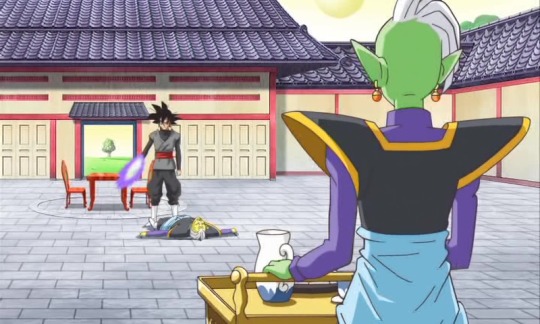
Goku Black knew that this other Zamasu would share his frustrations with mortals, so he found him, killed his version of Gowasu, and explained what he wanted to do. Overcome with fulfillment, the other Zamasu embraced his alternate self.

All right, but that only explains how Future Zamasu got in on this bit. How can Goku Black be the same Zamasu that Beerus destroyed in Episode 59? Simple, it’s because of the Time Ring. At least, that’s what Goku Black says. The way he remembers it, no one was there to stop him the day he killed Gowasu. So he took the Time Ring, became Goku Black, recruited Future Zamasu, and made him indestructible.


I pulled up the subtitles for this, just to make sure there was no confusion, because this part has always irritated me. Beerus spent like an episode and a half insisting that his way would work, and that his divine status overruled the empirical evidence Trunks had witnessed over the years. So was Beerus just talking out his ass, or did he just overlook a detail?

The dub implies that the Time Ring protected him from the causality effects of getting destroyed in the past, but that doesn’t add up, because Zamasu wasn’t wearing it when Beerus destroyed him. But Goku Black is wearing the Ring now, and he has been for the past seventeen years.
I think that’s what the idea is supposed to be. Beerus’s whole argument was that he went to the Zamasu of a particular timeline, the only timeline where he met Goku and developed his obsession with Goku, and destroyed that Zamasu. In theory, this should have a “Marty McFly Effect”, erasing Goku Black from existence, no matter what he does in the future or which timeline he goes to. And because Beerus is a Hakaishin, this doesn’t create any new timelines, like when mortals change the past like Trunks has done.
Episode 61 seems to be suggesting that Beerus’ plan could have worked, except he didn’t know that the Time Ring protects the wielder from changes in his own history. I guess that property would make sense, because the Supreme Kai who uses the Time Ring would need a way to be able to observe and interact with future events without potentially creating new timelines. For example, Zamasu killed that Barbari warrior 1000 years from now. I’m pretty sure that change in future events isn’t “locked in” or anything, and if someone were to destroy Planet Barbari in the next thousand years, that wouldn’t create a second timeline where Barbari survived so that the one poor dope could get murdered by Zamasu on schedule.
And I guess it makes sense that Beerus failed to take the Time Ring’s powers into account, since only the Supreme Kai of each universe is authorized to own and use them. Zamasu never even heard of the Time Rings until recently, and he was supposed to be training to eventually assume the office of Supreme Kai. It figures that Beerus, a Destroyer, wouldn’t know everything about how the Time Rings work and what they do.
In short: If Beerus had any influence over the rules of time, it was canceled out by the Time Ring. And since Beerus only knew to destroy Zamasu because he saw Goku Black wearing a Time Ring, he can’t unring that bell. There must have been a version of Zamasu who successfully obtained the Ring and became Goku Black. Beerus cannot undo this. All he accomplished was to branch the timeline so that in one branch, Zamasu no longer exists.

In the other branch, Goku Black continued with his plan, as seen in this flashback. He used the Time Ring to jump ahead one year, gathered the Super Dragon Balls in Age 780, and wished to swap bodies with Goku.

This left Goku trapped in Zamasu’s body, and in this timeline, Goku has never met Zamasu, or even heard of the guy.
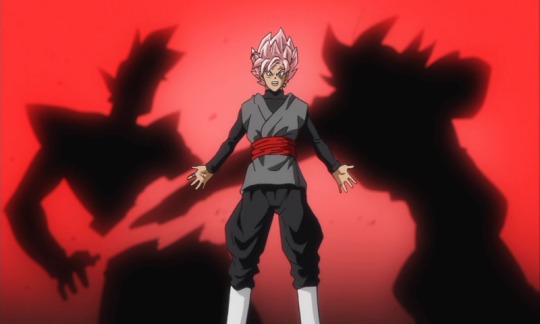
Then Goku Black teleported to Earth and killed the Goku of that timeline.

And he killed Chi-Chi and Goten too. No surprise there. After that, he went to the Universe 10 of Future Trunks’ alternate timeline, recruited the Zamasu native to that world, jumped ahead one more year with the Time Ring, and used the Super Dragon Balls a second time to give that Zamasu the indestructible body.

Then they went to the Future Trunks timeline and started carrying out their Project Zero Mortals thing. First they destroyed the Super Dragon Balls, then they started hunting down all the other gods in the twelve universes. This would ensure that there would be no one to stop them as they destroyed all other life in the universes. Wait, how the hell did they kill Jiren? And Broly?
Finally, the duo saved Earth for last, and they invaded one year before the events seen in Episode 47. Black says they’ve specifically reserved Earth for the grand finale, because they wanted to make the people there suffer the most out of everyone.
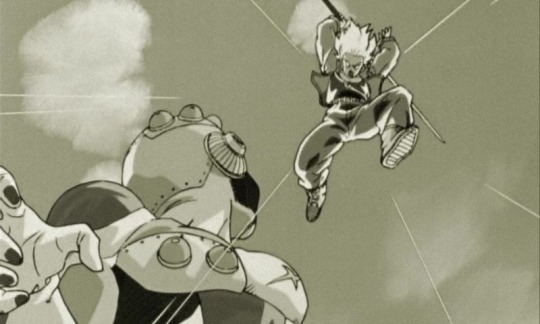
See, they thought about all this and decided that Earth is the root of all of this. Specifically, Trunks and his time machine, since his tinkering with history led to the creation of alternate timelines, which is what led to Zamasu being introduced to Goku in Episode 53, which resulted in Zamasu becoming Goku Black and kicking off Project Zero Mortals. So when you think about it that way, Trunks is responsible for all of this. If he had left well enough alone, Goku would have died of a heart virus and Zamasu would have never met him.
Actually, that doesn’t quite add up, but this post is running longer than I wanted, so I’ll try to explain what I mean later.
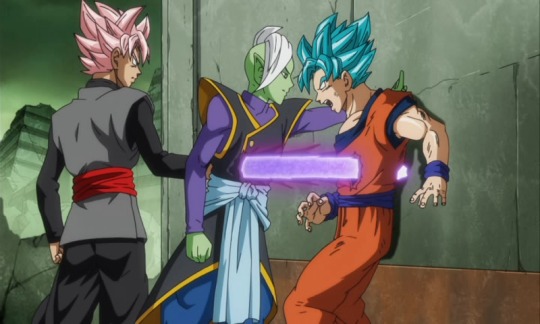
So I think I’ve covered all of the backstory stuff. Now let’s talk about the fighting in this episode. It sucks. Goku, Vegeta, and Trunks got their asses beat the last time they came here, and the only thing that’s changed is that they remembered to bring some senzu beans. Not that it matters, because the baddies quickly overwhelm Vegeta and Trunks, and corner Goku. They tell him the bit about how Goku Black killed Chi-Chi and Goten in his origin story, and Black stabs his hand-energy sword through Zamasu and into Goku while they talk about this.
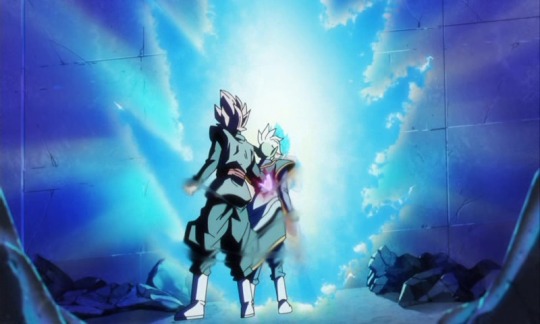
And that gets Goku all fired up, so he raises his power and starts going on a tear. Okay, so there’s a difference of opinion on this scene.
On the one hand, you could say: Hey, cool, Goku’s had all he can stands, and he can’t stands no more, and he’s gonna kick some ass because he loves his wife and kids. I can’t dispute that. This is a factually accurate statement.
However, on the other hand, this scene is dumb as hell, because Goku’s powering up while he’s got an energy beam sticking through his liver. Remember when Vegeta got stabbed this way and it didn’t kill him, but it kind of took him out of the fight for several minutes? Then he got up, went Blue, and fired a Final Flash anyway? Then he passed out until he got a senzu bean later? Yeah, well, that was really fucking stupid, and now we have Goku doing the same bullshit, only faster. He doesn’t even wait around for Black to pull out the beam.

Also, what exactly did Goku do to turn the tables here? He was already in his strongest form, so what has he powered up to? He’s just Super Saiyan Blue Goku With a Hole In His Liver, and somehow that makes him stronger than he was before, when he didn’t have a hole there.

Like, he’s a house of fire in this scene, and it looks cool, I won’t dispute that. It’s kind of nice watching him dominate Black and Zamasu like this... except...

Black just suddenly decides it’s time to start winning again, and he turns the tables on Goku without even trying hard.

So why is this hurting Goku when the gaping hole in his torso didn’t? Also, is one of those beams going in his dick? Why doesn’t Goku just power out of this like he did before? He’s still mad about Chi-Chi and Goten, isn’t he?
See, this is why this saga sucks. They tried to do this “Power Awakened by Rage” thing like they used to do in DBZ. Toddler Gohan vs. Raditz, Goku turning Super Saiyan for the first time on Namek, Gohan turning Super Saiyan 2 against Cell. These are all classic moments, and this episode tries to borrow some of that magic.
Except it’s all wrong. Toddler Gohan ran out of gas pretty quickly, but he still hurt Raditz enough for the others to finish him. They didn’t just have Raditz instantly recover from all the damage that headbutt did to him. And Super Saiyan 2 Gohan didn’t just start getting his ass kicked when it was convenient to the plot. He never stopped being angry at Cell, and his power never wavered. Cell got stronger, but not strong enough to prevent him from getting his just desserts.
Here, I think the idea is that Goku Black provoked Goku on purpose, then allowed Goku to pummel him a while, because somehow that helps Goku Black get stronger, like he claimed back in Episode 49. So I guess he was just toying with Goku? Which kind of makes Goku look like a total geek here.
But the rotten cherry on top of this moldy sundae is Goku screaming at them before he attacks. “’Cause now I’m mad! I’m really really mad!”
Seriously? That’s what they came up with? “I’m really really mad!”?
I mean, why stop there? Why not have Goku shout “I’m really really really mad!”? It’s pathetic. I forgot what he said in the subtitles, but I’m pretty sure it was equally unimpressive.

Okay, so after they take out Goku, they move on to Vegeta and Trunks, and that’s when they try to make this out to be all Trunks’ fault. And this makes Trunks mad. In fact, it might make him--dare I say it-- really really mad.
In fact, the way everyone’s reacting, it’s like Trunks has never been this mad before. He may have surpassed a level of anger beyond really really mad. Can it be?

Trunks has ascended to becoming really really really really mad! Like, these guys killed his mom and destroyed his whole world. They also attacked his girlfriend several times. But when they said a bunch of dumb stuff about time travel, that’s what pushed Trunks over the edge.
So the episode ends on this new power-up, so I guess this is the one we’re expected to take seriously, but it’s a little difficult to care when we just saw Goku do the exact same thing and get his ass kicked. I mean, Trunks’ form looks like something new, sort of? But even if it were legit, they completely undermined this story beat with the whole Goku thing they did.
Okay, enough of Episode 61. Let’s try to push forward.
#dragon ball#dragon ball super#2023dbapocryphaliveblog#goku#vegeta#trunks#zamasu#goku black#yajirobe#chi chi#goten#beerus#frieza#fuck the zamasu saga forever
34 notes
·
View notes
Text
51 notes
·
View notes
Text
Just saw a blog called asaconservative who just points out conservative hypocrisy by being like "as a conservative I want lower taxes and free speech which is why I'm into lowering the military budget and allowing kids to be trans" and it's like ... Babe, you're not doing anything with this. Conservative ideology is actually very consistent. It's in the name. It's about conserving the status quo of who's powerful and who's not.
Like idk what lib needs to hear this but you're not gonna get your political enemy with facts or logic or gotchas. They don't actually care about the deficit or taxes they just think being poor should be as hard as humanly possible and being rich should be rewarded because they're gouls who believe in prosperity gospel and the protestant work ethic. They talk about the deficit so they dont alienate the poor who thinks they'll be rich some day voter base. They don't actually like freedom of speech they just want to say slurs and hold fascist rallies and defend an original interpretation of the constitution because they want the 3/5ths clause to come back.
Every belief is like this. You can't say the n word anymore so you have to say forced bussing but you can't say that anymore either so you get even more abstract and you say tax cuts but in a way where black people get hurt worse than white people on average. They have admitted to that. But baby they're still saying the n word in their minds when they come up with policies.
You've gotta stop trying to debate them and start trying to defeat them.
21 notes
·
View notes
Text
“Mr. Garland’s memo did acknowledge that “spirited debate about policy matters is protected under our Constitution.” That is true but doesn’t go nearly far enough. Education is mostly speech, and parents have a constitutional right to choose the speech with which their children will be educated. They therefore cannot constitutionally be compelled, or even pressured, to make their children a captive audience for government indoctrination.
Public education in America has always attempted to homogenize and mold the identity of children. Since its largely nativist beginnings around 1840, public education has been valued for corralling most of the poor and middle class into institutions where their religious and ethnic differences could be ironed out in pursuit of common “American” values.
The goal was not merely a shared civic culture. Well into the 20th century, much of the political support for public schooling was driven by a fear of Catholicism and an ambition to Protestantize Catholic children. Many Catholics and other minorities escaped the indoctrination of their children by sending them to private schools.
Nativists found that intolerable. Beginning around 1920, they organized to force Catholic children into public education. The success of such a measure in Oregon (with Democratic votes and Ku Klux Klan leadership) prompted the Supreme Court to hold compulsory public education unconstitutional.
The case, Pierce v. Society of Sisters (1925), was brought by a religious school, not a parent. The justices therefore framed their ruling around the threat to the school’s economic rights. But Pierce says that parents can educate their children outside state schools in accord with the parents’ moral and religious views.
Although the exact nature of this parental freedom is much disputed, it is grounded in the First Amendment. When religious parents claim the freedom, religious liberty seems an especially strong foundation. But the freedom of parents in educating their children belongs to all parents, not only the faithful. Freedom of speech more completely explains this educational liberty.
(…)
The public school system, by design, pressures parents to substitute government educational speech for their own. Public education is a benefit tied to an unconstitutional condition. Parents get subsidized education on the condition that they accept government educational speech in lieu of home or private schooling.
(…)
To be sure, Pierce doesn’t guarantee private education. It merely acknowledges the right of parents to provide it with their own resources. And one may protest that economic pressure is not force. But the Supreme Court has often ruled otherwise.
(…)
When government makes education compulsory and offers it free of charge, it crowds out parental freedom in educational speech. The poorer the parents, the more profound the pressure—and that is by design. Nativists intended to pressure poor and middle-class parents into substituting government educational speech for their own, and their unconstitutional project largely succeeded.
Most parents can’t afford to turn down public schooling. They therefore can’t adopt speech expressive of their own views in educating their children, whether by paying for a private school or dropping out of work to home-school. So they are constrained to adopt government educational speech in place of their own, in violation of the First Amendment.
A long line of Establishment Clause decisions recognize the risk of coercion in public-school messages. In Grand Rapids School District v. Ball (1985), the high court condemned private religious teaching in rooms leased from public schools. “Such indoctrination, if permitted to occur, would have devastating effects on the right of each individual voluntarily to determine what to believe (and what not to believe) free of any coercive pressures from the State,” Justice William Brennan wrote for the majority.
Coercion seemed central in such cases because of the vulnerability of children to indoctrination. Summarizing the court’s jurisprudence, Justice Sandra Day O’Connor, concurring in Wallace v. Jaffree (1985), observed that “when government-sponsored religious exercises are directed at impressionable children who are required to attend school, . . . government endorsement is much more likely to result in coerced religious beliefs.”
(…)
Rights are “exceptions” to power, James Madison observed. That is, rights defeat power. But contemporary judicial doctrine allows power to defeat rights—at least when government asserts what is called a compelling interest. One might think that a state’s compelling interest in public education overpowers any parental speech right. Yet because such analysis allows power to subdue rights, it is important to evaluate whether the claimed government interest is really compelling.
The U.S. was founded in an era when almost all schooling was private and religious, and that already suggests that any government interest in public education is neither necessary nor compelling. Further, the idea that public education is a central government interest was popularized by anti-Catholic nativists. Beginning in the mid-19th century, they elevated the public school as a key American institution in their campaign against Catholicism.
In their vision, public schools were essential for inculcating American principles so that children could become independent-minded citizens and thinking voters. The education reformer and politician Horace Mann said that without public schools, American politics would bend toward “those whom ignorance and imbecility have prepared to become slaves.”
That sounds wholesome in the abstract. In practice, it meant that Catholics were mentally enslaved to their priests, and public education was necessary to get to the next generation, imbuing them with Protestant-style ideas so that when they reached adulthood, they would vote more like Protestants.
(…)
The inevitably homogenizing, even indoctrinating, effect of public schools confirms the danger of finding a compelling government interest in them. A 1904 nativist tract grimly declared that the public school is “a great paper mill, into which are cast rags of all kinds and colors, but which lose their special identity and come out white paper, having a common identity. So we want the children of the state, of whatever nationality, color or religion, to pass through this great moral, intellectual and patriotic mill, or transforming process.”
The idea of a common civic culture among children is appealing when it develops voluntarily, but not when state-approved identities and messages are “stamped upon their minds,” as the 1904 tract put it. Far from being a compelling government interest, the project of pressing children into a majority or government mold is a path toward tyranny.
The shared civic culture of 18th-century America was highly civilized, and it developed entirely in private schools. The schools, like the parents who supported them, were diverse in curriculum and their religious outlook, including every shade of Protestantism, plus Judaism, Catholicism, deism and religious indifference.
In their freedom, the 18th-century schools established a common culture. In contrast, public-school coercion has always stimulated division. It was long used to grind down the papalism of Catholic children into something more like Protestantism. Since then, there has been a shift in the beliefs that public schools seek to eradicate. But the schools remain a means by which some Americans force their beliefs on others. That’s why they are still a source of discord. The temptation to indoctrinate the children of others—to impose a common culture by coercion—is an obstacle to working out a genuine common culture.
There is no excuse for maintaining the nativist fiction that public schools are the glue that hold the nation together. They have become the focal point for all that is tearing the nation apart. However good some public schools may be, the system as a whole, being coercive, is a threat to our ability to find common ground. That is the opposite of a compelling government interest.
The public school system therefore is unconstitutional, at least as applied to parents who are pressured to abandon their own educational speech choices and instead adopt the government’s.
Parents should begin by asking judges to recognize—at least in declaratory judgments—that the current system is profoundly unconstitutional. Once that is clear, states will be obliged to figure out solutions. Some may choose to offer tax exemptions for dissenting parents; others may provide vouchers. Either way, states cannot deprive parents of their right to educational speech by pushing children into government schools.”
#education#public education#public schools#private schools#compulsory education#first amendment#freedom of speech#libertarian#libertarianism#catholocism#anticlericalism#constitution#unconstitutional
8 notes
·
View notes
Text
The South Carolina Republican senator is arguing that such testimony is foreclosed by the Constitution's Speech or Debate clause, which shields legislators from certain law enforcement action for conduct connected to their legislative duties.
What could you possibly be hiding, Lindsey?
#lindsey graham#clarence thomas#january 6th#january sixth#sedition#insurrection#treason#trump crime family
39 notes
·
View notes
Text
The Fulton County district attorney’s office is pushing back on Sen. Lindsey Graham’s ongoing efforts to quash a grand jury subpoena, saying his testimony is “essential” and could reveal more information about efforts by former President Donald Trump and his allies to overturn the 2020 election in Georgia.
Graham, a South Carolina Republican, is asking the 11th Circuit US Court of Appeals to put on hold a lower federal court order that Graham must testify to the grand jury, with the questions limited in scope.
The litigation over the subpoena has been on-going for months, with Graham initially moving to quash the motion in July. Prosecutors say that, after three failed attempts to quash his subpoena, Graham is repeating the same arguments. They are asking for the matter to be remanded back to a Fulton County Superior Court, which oversees the grand jury investigation.
“The Senator’s position, which would allow him to dictate when and where he will be immune from questioning or liability, renders him precisely the sort of unaccountable ‘super-citizen’ which the United States Supreme Court has taken care to avoid,” the Fulton County district attorney’s office said in the court filing with the 11th Circuit on Friday.
Graham’s attorneys argue that the lower court ruling did not offer enough protection from being questioned about his role as a US Senator.
They say that his calls to Georgia officials after the election were legislative activity directly related to his committee responsibilities as the then-chairman of the Senate Judiciary Committee, and that his actions should be protected by the US Constitution’s Speech or Debate Clause.
Atlanta-based federal Judge Leigh Martin May, who denied Graham’s motion to quash his subpoena this summer, wrote in her decision that there were “considerable areas of inquiry” that were not legislative in nature that he should have to testify about.
Fulton County District Attorney Fani Willis, who is leading the investigation into 2020 election interference, wrote in previous court filings that she wants to question the Senator about his phone calls to election officials.
Willis is particularly interested in a call Graham made to Georgia Secretary of State Brad Raffensperger when – according to Raffensperger – Graham hinted that Raffensperger should discard some Georgia ballots during the state’s audit.
Fulton County prosecutors on Friday said Graham’s claim that the call was intended to inform his vote on certifying the 2020 election amounts to “litigation-prompted hindsight” and “a product of lawyering, not legislating.”
Graham has repeatedly denied accusations of applying any pressure to Georgia officials. Even if he were to lose this appeal, he signaled he would take the case to the Supreme Court.
“I’ll go as far as I need to take it,” Graham told CNN last month. “I’m committed to standing up for the institution as I see it.”
The 11th Circuit will rule on Graham’s emergency motion. The appeals court has set Tuesday as deadline for his legal team to file an opening brief on the merits of the appeal.
For everyone Fact Checking at home...
• Graham didn’t make the phonecalls from the Senate floor, so his speech isn’t Constitutionally protected.
• Graham questioned the counting of votes in the state of Georgia, which is neither an election or state that he's particularly involved in as he's a Senator from South Carolina, saying he's "just asking questions," implying he could because he was "Senate Judiciary Chair," when he wasn't on a committee specifically overseeing or investigating elections at the time of the calls.
• Graham suggested to the Georgia Secretary of State that he could throw out some votes during the state's audit of ballots.
He has no justification for his actions.
#us politics#news#cnn#cnn politics#2022#sen. lindsey graham#georgia#georgia election investigation#fulton county#11th circuit court of appeals#donald trump#2020 election#Fulton County Superior Court#senate judiciary committee#us constitution#Speech or Debate Clause#Judge Leigh Martin May#Fani Willis#election interference#brad raffensperger#my thoughts
13 notes
·
View notes
Text
COMMENT: Marty,
I hear Trump is to be arraigned, this time the first with a mugshot that will certainly go viral worldwide, on Aug. 25th. This is immediately after the BRICS summit on Aug, 22-24 with discussions of a new non-dollar trading currency. I can’t believe these lunatics are going to prove to the world America is now a banana republic at such a critical juncture of time. They just can’t help themselves can they? Your De-Dollarization report released this month couldn’t have been timed better.
Regards, Rob
REPLY: Our computer had this week for a Directional Change and next week as a target for a turning point. Then we have a Panic Cycle the week of September 25th. Our February Monthly AI Timing Array, published on the private blog, showed that August was a key turning point. There was a Direction Change in April and a May low. June suddenly rallied and closed above the May high. August has been a key target, and the volatility will rise afterward.
We have a severe Constitutional Crisis. All of these prosecutions against Trump are to interfere with the 2024 election, which violates everyone’s constitutional rights. But worse still, they have all coordinated their attacks and conspired together. This is destroying our legal system. This will now be unrestrained about the legal system, for Republican prosecutors are now free to indict Hillary, Pelosi, and down the line. State prosecutors can now indict all the Democrats, and the DOJ, firmly in control of the Neocons, cannot order a state prosecutor to stand down. All of these indictments against Trump when he is the lead candidate for the 2024 election signals to the entire world that this is the end of the United States experiment in Liberty & Justice for All. It is simply all over. The abuse of the law will now become a free-for-all. Mark Meadows has already moved to transfer the case from the crazy prosecutor to a federal court.
The intent expressly stated in the Constitution recognized that there could be a situation where they would charge a Senator or Congressman and prevent them from voting in order to pass an unpopular bill. Even the founding fathers never anticipated that they would use the law to prevent someone from running for office. This violated everybody in this country’s fundamental substantive due process of law.
U.S. Constitution Article I. Legislative Branch Section VI Clause I
The Senators and Representatives shall receive a Compensation for their Services, to be ascertained by Law, and paid out of the Treasury of the United States. They shall in all Cases, except Treason, Felony and Breach of the Peace, be privileged from Arrest during their Attendance at the Session of their respective Houses, and in going to and returning from the same; and for any Speech or Debate in either House, they shall not be questioned in any other Place.
There is such a thing as the Supervisory Power of the Supreme Court. Because Trump is now charged in three separate states, plus the notorious District of Columbia, this calls for a petition directly to the Supreme Court under their Supervisory Power because each court pretends that Trump is not the leading candidate. Here we have this ethically corrupt judge in DC who refuses to even acknowledge that Trump was the president calling him Mr. Trump in court. This demonstrates her bias.
Before Justice Barrett joined the Supreme Court, we commented on the Supervisory power of the Supreme Court.
4 notes
·
View notes
Text
..."A federal judge has ruled that former Vice President Mike Pence will have to testify before a grand jury after he was subpoenaed by the special counsel investigating efforts by former President Donald Trump and his allies to overturn the results of the 2020 election.
That’s according to two people familiar with the ruling, who spoke on condition of anonymity because it remains under seal.
The people said, however, that the Pence would not have to answer questions about his actions on Jan. 6, 2021, when a violent mob of Trump’s supporters stormed the building as Pence was presiding over a joint session of Congress to certify the vote.
Pence had argued that, because he was serving in his capacity as president of the Senate that day, he was protected from being forced to testify under the Constitution’s “speech or debate” clause, which is intended to protect members of Congress from questioning about official legislative acts.
The extraordinary scenario of a former vice president potentially testifying against his former boss in a criminal investigation comes as Pence has been weighing challenging Trump for the 2024 Republican presidential nomination.
Pence’s team is discussing whether it will appeal."
10 notes
·
View notes
Link
7 notes
·
View notes
Photo

By Eugene Scott August 15, 2022 at 10:38 a.m. ET A federal judge on Monday denied Sen. Lindsey O. Graham’s (R-S.C.) request to quash his subpoena in Georgia prosecutors’ investigation into potential criminal interference in the 2020 presidential election by President Donald Trump and his allies, signaling he must testify in the probe. Graham had argued that he should be exempt from testifying because of speech or debate clause protections, sovereign immunity and his position as a high-ranking government official. U.S. District Judge Leigh Martin May rejected all three arguments. “The Court finds that the District Attorney has shown extraordinary circumstances and a special need for Senator Graham’s testimony on issues relating to alleged attempts to influence or disrupt the lawful administration of Georgia’s 2022 elections,” the judge wrote. FULL STORY HERE: Graham must testify in Ga. probe of effort to overturn 2020 election, judge rules https://www.washingtonpost.com/national-security/2022/08/15/trump-2020-election-georgia-investigation/ #lindseygraham #Trump #electionfraud #trumpismypresident #trump2024 #trumprally https://www.instagram.com/p/ChSMUtPLFpZ/?igshid=NGJjMDIxMWI=
7 notes
·
View notes
Photo

“Red Supporter Heard In House,” Kingston Whig-Standard. February 22, 1933. Page 1..
---
Spectator Tells William Irvine to "Give It to Them"
---
OTTAWA, Feb. 22— Orders were issued last night to House of Commons guards to eject from the public galleries all spectators who caused disturbance.s This action followed a minor commotion in the galleries during debate on a resolution to repeal the famous Section 98 of the Criminal Code, dealing with sedition and unlawful assemblies.
“Give it to them! That's the stuff,” exclaimed a young man in the north gallery, while William Irvine (U.F.A. Wetaskinwin) attacked Station 98 as archaic, drastic, and tempered to breed disrespect for law and order.
A guard rushed to the young man's chair, ordering him to leave speech-making to the members below. The man grabbed his coat and fled.
The House devoted an hour to consideration of the resolution of J. S. Woodsworth, leader of the Co-operative Commonwealth Federation, to repeal Section 98. Hon. Maurice Dupre, Solicitor-General, upheld the section as a bulwark against communism and radicalism, while William Irvine and Samuel Factor (Lib., Toronto West-Centre) characterised it as drastic and the type of legislation that fostered communism. Under one clause, said Mr. Factor, a man could be imprisoned twenty years for wearing a certain type button in his coat lapel,
Communist agitation was prevalent and was increasing all over Canada, declared Hon. Maurice Dupre. He charged that the move of the Liberal Government in 1926 to repeal Section 98 was prompted by Mr Woodsworth and that this was the price which the then Prime Minister was prepared to pay for the support of the Labor Group in the House of Commons.
#parliament of canada#house of commons#canadian politics#parliamentary debate#heckling#section 98#communism#anti-communism#suppression of dissidents#suppression of free speech#iron heel#co-operative commonwealth federation#united farmers#communist party of canada#democracy in canada#great depression in canada#political prisoners
2 notes
·
View notes